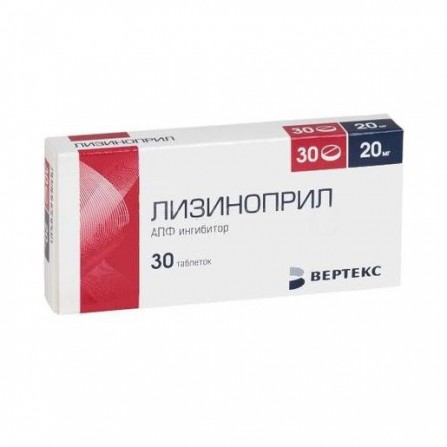More info
Description
Lisinopril is designed to gently lower blood pressure. The drug has a hypotensive, vasodilating, cardioprotective, natriuretic effect.
Active ingredients
Lisinopril
Release form
Pills
Composition
Lisinopril dihydrate, lactose monohydrate, microcrystalline cellulose, croscarmallose sodium, magnesium stearate.
Pharmacological effect
An ACE inhibitor, reduces the formation of angiotensin II from angiotensin I. A decrease in the content of angiotensin II leads to a direct decrease in the release of aldosterone. Reduces the degradation of bradykinin and increases prostaglandin synthesis. Reduces the total peripheral vascular resistance, blood pressure (BP), preload, pressure in the pulmonary capillaries, causes an increase in the minute volume of blood and an increase in myocardial tolerance to stress in patients with chronic heart failure. Expands arteries to a greater extent than veins. With prolonged use, hypertrophy of the myocardium and the walls of resistive arteries is reduced. Improves blood supply to ischemic myocardium. Start of action - after 1 hour. The maximum effect is determined after 6-7 hours and lasts for 24 hours. In case of arterial hypertension, the effect is noted in the first days after the start of treatment, a stable action develops after 1-2 months.
Pharmacokinetics
Sucked from the gastrointestinal tract (GIT) on average by 25%, but the absorption can vary from 6 to 60%. Bioavailability is 25%. Food intake does not affect absorption. Lisinopril is not biotransformed in the body. Excreted by the kidneys unchanged. The half-life is 12 hours.
Indications
Arterial hypertension, Chronic heart failure, Early treatment of acute myocardial infarction in combination therapy, Diabetic nephropathy.
Contraindications
Hypersensitivity to lisinopril or other ACE inhibitors, angioedema, a history of edema, including the use of ACE inhibitors, hereditary angioedema, or idiopathic angioedema, lactase deficiency, lactose intolerance, glucose-galactose malabsorb syndrome
Precautionary measures
Precautions: Severe renal dysfunction, bilateral renal artery stenosis or stenosis of the artery only kidneys with progressive azotemia, condition after kidney transplantation, azotemia, hyperkalemia, aortic stenosis, hypertrophic obstructive kardimiopatiya, primary aldosteronism, hypotension, cerebrovascular disease (including cerebrovascular insufficiency), coronary heart disease, coronary insufficiency, autoimmune systemic diseases of connective tissue (including scleroderma, systemic lupus erythematosus), inhibition of bone marrow hematopoiesis, diet with limited salt, hypovolemic states (including as a result of diarrhea, vomiting), old age, hemodialysis using high-flow dialysis membranes with high permeability (AN69).
Use during pregnancy and lactation
Contraindicated
Dosage and administration
Inside, 1 time per day in the morning, regardless of the meal, preferably at the same time. In hypertension, patients who do not receive other antihypertensive drugs are prescribed 5 mg 1 time per day. In the absence of effect, the dose is increased every 2-3 days by 5 mg to an average therapeutic dose of 20-40 mg / day (an increase in dose over 40 mg / day usually does not lead to a further decrease in blood pressure). The usual daily maintenance dose is 20 mg. The maximum daily dose is 40 mg. The full effect usually develops after 2-4 weeks from the start of treatment, which should be considered when increasing the dose. With insufficient clinical effect, it is possible to combine the drug with other antihypertensive drugs.
Side effects
A pronounced decrease in blood pressure, orthostatic hypotension, paresthesias, mood lability, confusion, drowsiness, jerky muscles of the limbs and lips.
Overdose
Symptoms (occur when taking a single dose of 50 mg): a pronounced decrease in blood pressure, dryness of the oral mucosa, drowsiness, urinary retention, constipation, anxiety, irritability. Treatment: no specific antidote. Symptomatic therapy. Gastric lavage, the use of enterosorbents and laxatives. Intravenous administration of 0.9% sodium chloride solution is shown.In the case of treatment-resistant bradycardia, it is necessary to use an artificial pacemaker. It is necessary to control blood pressure, indicators of water and electrolyte balance. Hemodialysis is effective.
Interaction with other drugs
When used simultaneously with potassium-sparing diuretics (spironolactone, triamterene, amiloride), potassium preparations, salt substitutes containing potassium, cyclosporine, the risk of hyperkalemia increases, so they can be used together only with regular monitoring of serum potassium and kidney function. The combined use of lisinopril with beta-blockers, blockers of "slow" calcium channels (BMCC), diuretics, tricyclic antidepressants / neuroleptics and other antihypertensives increases the severity of hypotensive action. Antacids and colestyramine reduce the absorption of lisinopril in the gastrointestinal tract. When used together with insulin and hypoglycemic agents for oral administration, the risk of hypoglycemia is possible. Nonsteroidal anti-inflammatory drugs (NSAIDs) (including selective cyclooxygenase-2 inhibitors (COX-2)), estrogens, adrenomimetiki reduce the hypotensive effect of lisinopril. With the simultaneous use of ACE inhibitors and intravenous gold preparations (sodium aurothiomalate), a symptom complex has been described, including facial flushing, nausea, vomiting, and a decrease in blood pressure. When combined with selective serotonin reuptake inhibitors, it can lead to severe hyponatremia. Combined use with allopurinol, procainamide, cytostatics can lead to leukopenia.



